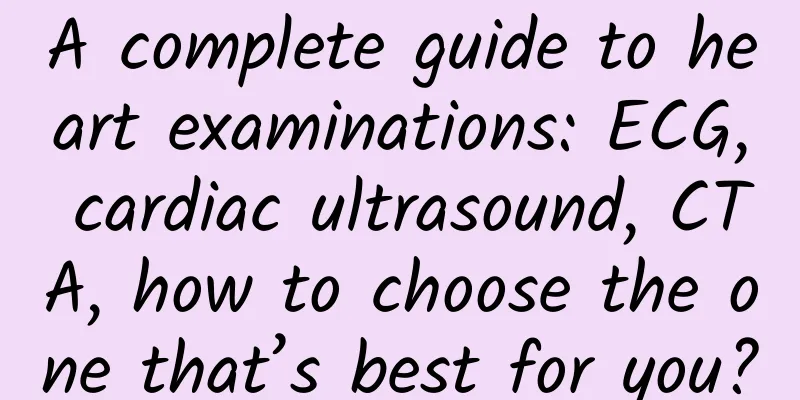A complete guide to heart examinations: ECG, cardiac ultrasound, CTA, how to choose the one that’s best for you?

|
Author: Zhang Lei, deputy chief physician, Xuanwu Hospital, Capital Medical University Reviewer: Xia Jinggang, Chief Physician, Xuanwu Hospital, Capital Medical University Heart problems should not be underestimated, but when many people hear that they need to undergo a checkup, they may have a lot of questions in their minds: "Should I do an electrocardiogram? A cardiac ultrasound? Or something called CTA?" Don’t worry! Today, we will use a relaxed way to tell you which heart examinations to do under what circumstances, and by the way, you no longer have to worry about those complicated medical terms. 1. Electrocardiogram: the “voltmeter” of the heart 1. What is an electrocardiogram? Imagine that your heart is like a motor that runs 24 hours a day, and an electrocardiogram is like a "voltmeter" that monitors whether its wires are connected. It can help you see whether your heart beats in sync and whether there is any leakage (that is, irregular heartbeat). 2. When should an electrocardiogram be done? You feel your heart beating like a marathon: If you suddenly feel that your heart is beating more crowded and chaotic than the subway during rush hour on Monday, hurry up and do an electrocardiogram, which can tell you whether your heart is drumming or dancing (that is, arrhythmia). When chest pain strikes, it’s not because you’ve eaten too much: If you feel your chest is stuffy as if a large rock is pressing on it, an electrocardiogram can check whether your heart is receiving insufficient blood supply or that a “major heart event” (myocardial infarction) is about to occur. Dizziness, palpitations and shortness of breath: These feelings may be caused by irregular heartbeat. An electrocardiogram will reveal the answer immediately. Why do you do an electrocardiogram? It is quick and convenient, just like the "heart test" in a physical examination. It does not take time or effort, and you can even have breakfast before going to the clinic! Figure 1 Copyright image, no permission to reprint 2. Cardiac ultrasound: "dynamic live broadcast" of the heart 1. What is cardiac color Doppler ultrasound? Cardiac color Doppler ultrasound is not the kind of "filter" we usually use on our mobile phones. It uses ultrasound to give you a "high-definition live broadcast" of your heart, capturing every "thump thump" of your heart in real time. 2. When should I do a cardiac ultrasound? (1) Did your doctor tell you that you have a heart murmur? That’s right, doctors will sometimes put a stethoscope to your chest and listen carefully. If they suspect that your heart valve is acting up, they will immediately do a 360-degree live cardiac ultrasound to see if the valve is leaking. (2) I have chest pain again, but the electrocardiogram is normal? That could be a structural problem with my heart, such as my heart muscles being stronger than those of a gym rat. Color Doppler ultrasound can help you figure out whether these muscles are healthy or overly aggressive. (3) Is high blood pressure causing trouble? Long-term high blood pressure can put a lot of pressure on the heart. Cardiac ultrasound can check the heart's pumping function to see if it can continue to work. 3. Why do you need a cardiac ultrasound? A cardiac ultrasound is like a "reality show" of the heart. Its movements and postures are clearly visible. It is completely non-invasive and allows you to enjoy your heart's "performance" while listening to the "ultrasound beep". 3. CTA——Coronary artery traffic jam, let’s have “traffic monitoring” 1. What is CTA? The full name of this high-tech term is Coronary CT Angiography. Simply put, it is a CT scan of your heart's blood vessels to see if there is any traffic jam on the "highway" of the coronary artery. 2. When should you make a CTA? (1) Chest pain often occurs at important moments in your life: If you feel that your chest pain is not caused by eating too much, but is as frequent as popcorn getting stuck in your throat while watching a movie, then your doctor may recommend that you do a CTA to see if your coronary arteries are blocked and the blood in the coronary arteries is blocked like rush hour. (2) Family history of coronary heart disease: If an elder in your family has a heart attack due to coronary heart disease, CTA can help you check in advance to see if your coronary arteries have also started to "work overtime." (3) If you have the "three highs": high blood pressure, high blood sugar, and high blood lipids, this may cause coronary artery narrowing. CTA can tell you whether you should find a "road repair team" (doctor) just like a traffic report. 3. Why do you do CTA? CTA can clearly show the condition of the coronary arteries. It is a "traffic monitoring" of the heart and blood vessels. Cardiologists can see at a glance which road is open and which road is blocked. However, CTA requires the use of contrast agents, so those who are allergic to iodine or have poor kidney function should inform the doctor in advance. 4. Which test should I choose? (1) If you feel your heart is beating like a marathon, first do an electrocardiogram to see if there is any poor contact in the heart's "circuit". (2) If the doctor says that he hears "noise", or you always feel anxious or chest tightness: don't hesitate, have a cardiac ultrasound to see if there is any structural problem with this "little motor" of the heart. (3) Do you have chest pain that makes you suspect your heart is blocked? Then CTA is your "high-speed monitoring" that can clearly see whether your blood vessels are narrowed and whether a doctor's intervention is needed. Figure 2 Copyright image, no permission to reprint Conclusion: Don’t let your heart hide things from you. Check your heart highway regularly. Electrocardiogram, cardiac ultrasound and CTA, these three examinations have their own strengths, just like the unique skills of martial arts masters. Which one to use depends on your physical condition and the advice of the doctor who treats the symptoms. Modern life is fast-paced, but we must take good care of our hearts and not let them be as congested as city traffic. Caring for the heart is our most basic responsibility to our own bodies. Next time you come across these high-sounding medical terms, don't be nervous, they are actually the "guardians" of the heart. As long as the examination is done correctly, your health will be firmly in your own hands! |
<<: Scientific care for patients with swallowing disorders
Recommend
Can a paternity test be done on a pregnant child?
There are a lot of things to do during pregnancy....
Can I still have sex after menopause?
After menopause, women's body functions in al...
What is the relationship between Liu Qingluan and Yue Qiluo in Wu Xin: The Monster Killer 3? Does Liu Qingluan die in the end?
Recently, Wu Xin: The Monster Killer 3, starring ...
What is the fastest personal care method for breast enlargement?
The most attractive part of a woman to men is her...
Crush vitamin b6 with aloe vera gel
Aloe vera gel has certain skin whitening and nour...
How to pickle dried white radish? How to remedy the bitterness of pickled white radish
The more common large varieties of white radish i...
What are the sequelae of uterine fibroid surgery?
Due to various reasons, many women now suffer fro...
How long does it take for menstruation to come after an abortion?
Menstruation is very important for women because ...
Is "stool retention" a health killer? Do you really need to moisturize and clean it?
Nowadays, advertisements for health products are ...
What is the reason why leucorrhea is jelly-like?
Leucorrhea refers to a substance secreted from a ...
The "magic drug" that changed the world! Was aspirin born from a doctor's filial piety?
There is a drug that you may not have taken, but ...
The benefits of eating garlic for women
It is good for female friends to eat some garlic ...
How to use medicines safely through the “five steps”?
Author: Zhao Zhigang, Chief Pharmacist, Beijing T...
How to treat vulvar swelling
Women have always been reluctant to talk about th...









